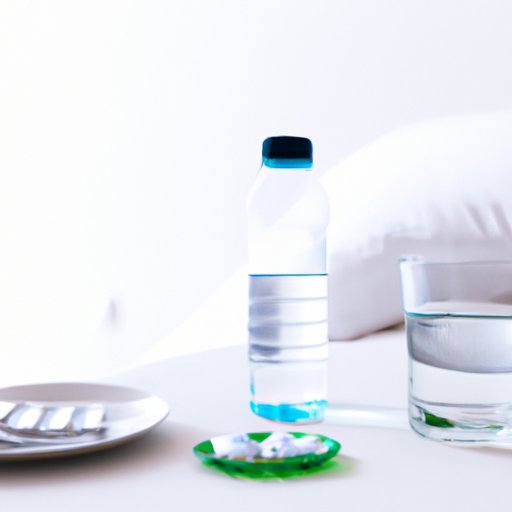Introduction
Dry mouth, also known as xerostomia, is a condition in which the saliva glands in your mouth don’t produce enough saliva. This can lead to an uncomfortable feeling of dryness in your mouth. Dry mouth while sleeping can be particularly bothersome, as it can cause difficulty swallowing or sleeping, as well as bad breath.
Drink Water Before Bedtime
One of the best ways to prevent dry mouth while sleeping is to drink plenty of water throughout the day, including before bedtime. Drinking water helps keep your mouth hydrated and prevents dryness. It also helps flush away bacteria that can cause bad breath.
When it comes to drinking water throughout the day, aim for at least eight 8-ounce glasses of water per day. If you’re having trouble getting enough water, try carrying a water bottle with you during the day, keeping a pitcher of water in your refrigerator, or setting reminders on your phone.
Use a Humidifier in the Bedroom
Using a humidifier in your bedroom can also help prevent dry mouth while sleeping. Humidifiers add moisture to the air, which can help keep your mouth and throat hydrated. Additionally, humidifiers can help reduce snoring and make it easier to breathe while sleeping.
When selecting a humidifier, look for one with a built-in hygrometer, which will measure humidity levels in your room. You should also consider the size of your room when selecting a humidifier, as small rooms may only require a smaller device. Finally, make sure to clean your humidifier regularly to prevent the growth of mold or mildew.
Chew Sugar-Free Gum or Mints
Chewing sugar-free gum or mints can also help keep your mouth hydrated and prevent dryness while sleeping. Chewing stimulates saliva production, which helps keep your mouth moist. Sugar-free gum or mints are preferable over regular gum or mints, as the sugar in them can feed the bacteria that cause bad breath.
When choosing sugar-free gum or mints, opt for ones that contain xylitol, as this has been shown to help prevent cavities and tooth decay. Additionally, look for products that are low in calories and artificial sweeteners.

Avoid Alcohol and Caffeinated Beverages
Alcohol and caffeinated beverages can contribute to dry mouth while sleeping, so it’s best to limit or avoid them. Alcohol is a diuretic, meaning it increases urine production, which can lead to dehydration. Caffeine is also a diuretic and can cause your body to lose fluids more quickly than normal.
If you’re looking for alternatives to alcohol and caffeinated beverages, try herbal teas, decaffeinated coffee, or sparkling water. You can also try adding fresh fruits or herbs to your water for added flavor.
Keep Your Bedroom Cool
Another way to prevent dry mouth while sleeping is to keep your bedroom cool. A room that is too hot can dry out your mouth, leading to discomfort. Aim to keep your bedroom temperature between 60 and 67 degrees Fahrenheit for optimal comfort.
To keep your room cool, try opening windows or using a fan. If you live in a particularly hot climate, you may want to consider investing in an air conditioning unit. Additionally, you may want to avoid using electric blankets or heating pads in your bed, as these can make your room too warm.

Use a Mouthwash or Oral Rinse
Using a mouthwash or oral rinse can also help prevent dry mouth while sleeping. Mouthwashes and oral rinses help remove bacteria from your mouth, which can help reduce bad breath and keep your mouth hydrated. Look for mouthwashes and oral rinses that contain fluoride, as this can help protect your teeth from decay.
When using a mouthwash or oral rinse, make sure to follow the directions on the label. Additionally, avoid mouthwashes and oral rinses that contain alcohol, as this can further dry out your mouth.
See Your Doctor
If your dry mouth persists despite trying the above remedies, you may want to see your doctor. Some medical conditions, such as diabetes, thyroid problems, and Sjögren’s syndrome, can cause dry mouth. Your doctor may be able to recommend treatment options for these conditions.
When visiting your doctor, be sure to tell them about your symptoms, as well as any medications you’re taking. They may also ask you to bring a list of all the medications you’re taking, as some medications can cause dry mouth as a side effect.
Conclusion
Dry mouth while sleeping can be an uncomfortable experience. Fortunately, there are several ways to help prevent it. Drinking plenty of water throughout the day, using a humidifier in the bedroom, chewing sugar-free gum or mints, avoiding alcohol and caffeinated beverages, keeping your bedroom cool, and using a mouthwash or oral rinse can all help prevent dry mouth while sleeping.
If your dry mouth persists despite trying the above remedies, you may want to see your doctor, as some medical conditions can cause dry mouth. With these tips, you can help ensure a comfortable night’s sleep without worrying about dry mouth.


